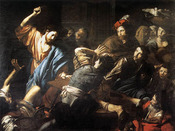|
Does 1 John 1:9 Apply to Believers Today? response by Tami Jelinek The question often arises in discussions of the implications of our completely fulfilled redemption: “What about 1 John 1:9? It says that if we confess our sins, He will forgive us and cleanse us from all unrighteousness. How do we apply this verse today if we have already been forgiven and cleansed?” Hebrews 10:14 tells us that by one sacrifice we have been "perfected forever." Colossians 1:22 tells us that we are now "holy and unblameable and unreprovable in His sight." 2 Corinthians 5: 21 says that we have been "made the righteousness of God." Yet many of us grew up in church being taught, as Christians, to practice 1 John 1:9 daily: "If we confess our sins, He is faithful and just to forgive us our sins, and to cleanse us from all unrighteousness." And thereby, we were taught that God's forgiveness was conditional, and must be re-sought, re-applied, and in effect: re-earned every day. It is no wonder that many Christians, even among those who espouse a belief in fulfilled or covenant eschatology, have a hard time believing they have been completely forgiven and have entered His eternal, glorious rest. Since we have come to see redemption as fulfilled, and the cross as completely efficacious and victorious, we must revisit formerly “familiar” passages and examine them within this new, Biblical paradigm. So what about 1 John 1:9? Does it apply today? Notice that it reads very much like a gospel message: If we confess our sins, he is faithful and just to forgive us our sins, and to cleanse us from all unrighteousness. Compare it to: Acts 3:19 Repent ye therefore, and be converted, that your sins may be blotted out, when the times of refreshing shall come from the presence of the Lord; John is telling his readers how to be born again. He is preaching the same message Peter was in Acts. We should also keep in mind that later in John's epistle we read: 1 John 3:9 Whosoever is born of God doth not commit sin; for his seed remaineth in him: and he cannot sin, because he is born of God. One who has not yet been born of God must confess his sins, and he will be forgiven and cleansed. But one who has been born of God cannot sin. There seems to be a clear progression between chapters one and three of John's epistle. Isn't this the definition of a Christian: one who has been forgiven and cleansed? 1 Corinthians 6:9 Know ye not that the unrighteous shall not inherit the kingdom of God? Be not deceived: neither fornicators, nor idolaters, nor adulterers, nor effeminate, nor abusers of themselves with mankind, 10 Nor thieves, nor covetous, nor drunkards, nor revilers, nor extortioners, shall inherit the kingdom of God. 11 And such were some of you: but ye are washed, [cleansed from all unrighteousness--1 John 1:9] but ye are sanctified, but ye are justified in the name of the Lord Jesus, and by the Spirit of our God. One might say that John's epistle was written only to those who were already Christians. But look at this wording at the beginning: 1 John 1:3 That which we have seen and heard declare we unto you, that ye also may have fellowship with us: and truly our fellowship is with the Father, and with his Son Jesus Christ. Yes, it was written to the church, but it was a church to which many were being added daily, as people believed "that which [the apostles had] seen and heard" so that they would enter into fellowship with God and His people. In other words, there were clearly people listening who had not yet entered into that fellowship. Otherwise, why would John have said, "we are telling you this so that you may have fellowship with us?" It is also important to recognize that this particular gospel delivery in 1 John 1 was tailor-made for a Jewish audience. Imagine yourself back there preaching the message of the cross and justification by grace alone through faith to law-abiding Jews. It is reasonable that many of them might have trouble admitting they were “sinners." So John starts off by saying: 1 John 1:8 If we [we Jews, who have obeyed the law our whole lives] say that we have no sin, we deceive ourselves, and the truth is not in us. (John understood their mindset, and knew what they needed to hear.) But 1 John 1: 9 If we confess our sins, he is faithful and just to forgive us our sins, and to cleanse us from all unrighteousness. Also significant is the plural pronoun we, as well as the present continuous tense of the verb confess. This passage cannot be properly understood apart from the covenant change going on in the first century, and the corporate body to which that change was being applied: 2 Corinthians 3:16...when one turns to the Lord, the veil is taken away. 17 Now the Lord is the Spirit; and where the Spirit of the Lord is, there is liberty. 18 But we all, with unveiled face, beholding as in a mirror the glory of the Lord, are being transformed into the same image from glory to glory, just as by the Spirit of the Lord. Notice that as each one (individually) turned to the Lord (or confessed their sins and were forgiven and cleansed) they individually experienced the liberty of the Spirit; and as that process continued, they all (as a body) were being transformed from old covenant glory to new covenant glory, into the image of Christ. So although the transformation process to which 1 John 1:9 primarily refers came to complete fruition in the first century when the body of Christ was raised incorruptible; it applies today just as the gospel applies today and forever more. Printable PDF file of this article:
|
Tami Jelinek 
Tami Jelinek is a part-time senior care giving coordinator and full-time seminarian, currently working toward her Master of Divinity degree. Tami and her husband of twenty-six years, Keith, reside in Auburn Hills, Michigan. They have three grown children. Tami’s personal passion is theology: the knowledge and experience of the Truth and Mercy found only in the person and work of Jesus Christ, and displayed in the lives and communion of His people. Exploring portraits of Christ and His kingdom in the Old Testament is the primary focus of her studies. Tami and Keith enjoy traveling, and love to fill their home with friends and family who share their fondness for good food, good wine, and great conversation.
A related quote from our good friend Tim King: Hebrews 9-10 teaches that the Old Covenant way of dealing with sins was through repetitive rituals -- sacrifices, visits to the priests and temple, etc. -- whereas those in Christ have had their sins removed once and for all by Jesus offering himself. Hebrews 9:14 teaches that it is the blood of Christ that cleanses the conscience from dead works, not confession. One reader's response to this article: Tami, that was outstanding! I have always been perplexed by that verse & you are very astute in saying that it is difficult to comprehend the completeness of our forgiveness in the light of the "if" used by John. This reminds me of another verse that has until recently hindered my prayer life. You know it well: "The effective prayer of a righteous man availeth much." Recognizing the depravity of my condition apart from Christ caused great consternation in my prayer life because I knew that I was not righteous, and therefore assumed that my prayers oftentimes were bouncing off the rafters & deflected to the earth. However, context is so vitally important as you point out and employing the analogy of faith is absolutely crucial. There are a plethora of passages that make clear the fact that we have been declared righteous by faith...but for some reason I determined that the righteousness spoken of by James was based upon human effort. At any rate, thanks for the clarification on 1 John 1:9. I will sleep more soundly tonight having a more complete understanding of this verse. You're the best. Blessings, Chuck Coty <>< Related Articles: | ||||||


